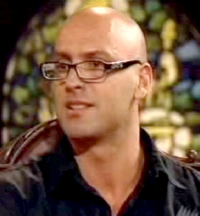Steven Angelides: Difference between revisions
No edit summary |
|||
| (10 intermediate revisions by 2 users not shown) | |||
| Line 1: | Line 1: | ||
[[Image:Steven Angelides.jpg|thumb|Steven Angelides]] | [[Image:Steven Angelides.jpg|thumb|Steven Angelides]] | ||
'''Steven Angelides''' is an academic specializing in queer and gender studies. From his | '''Steven Angelides''' is an academic specializing in queer and gender studies at La Trobe University, Australia. From his previous positions as a fellow at Monash University and the University of Melbourne, he published subversive analyses of [[Research: Youth sexuality|child sexuality]], [[pedophilia]], and [[Inequality|inequalities]]. ''Feminism, Child Sexual Abuse, and the Erasure of Child Sexuality'' earned Angelides the 2004 American Modern Language Association Crompton-Noll Award. In 2019, he published a book on the history of the child sex panic, titled ''The Fear of Child Sexuality''. | ||
While Angelides's views on adult-child sex are not explicitly liberal, he rejects the theory of [[ | While Angelides's views on adult-child sex are not explicitly liberal, he rejects the theory of [[intrinsic harm]]: | ||
<blockquote>''In psychoanalytic terms, it is an oversimplification to assume that certain sexual acts ''in themselves'' cause a standard traumatic response. If this were the case, how could we explain why it is that one child who was fondled by an adult is suffering traumatic symptoms while another subject to the same experience is not? At its most basic, what makes two people differ in their reactions to any experience is the subjective meaning attributed to that experience.''<ref>[https://web.archive.org/web/20110311065623/http://arts.monash.edu.au/womens-studies/staff/documents/sex-and-the-child.pdf Essay: Sex and the Child]</ref></blockquote> | |||
==External links== | ==External links== | ||
*[http://web.archive.org/web/20050615160453/http://www.australian.unimelb.edu.au/aboutus/people/angelides.html University of Melbourne biography] | *[http://web.archive.org/web/20050615160453/http://www.australian.unimelb.edu.au/aboutus/people/angelides.html University of Melbourne biography] | ||
*[https://latrobe.academia.edu/StevenAngelides Publications] - Academia.edu. | |||
===Publications (live)=== | |||
*''[https://annas-archive.org/md5/ed8f7d89f2cb17a364905a92e147b09d The Fear of Child Sexuality]'' (2019) - See also [http://wapercyfoundation.org/?page_id=1037 Percy Foundation review]. | |||
*[http://www.ipce.info/library_3/files/angelides_frame.htm The Emergence of the Paedophile in the Late Twentieth Century] (2005) | |||
*[https://sci-hub.ru/10.1215/10642684-10-2-141 Feminism, Child Sexual Abuse, and the Erasure of Child Sexuality] (2004); a copy on [https://web.archive.org/web/20130420133540/http://snifferdogonline.com/reports/Child%20Abuse,%20Sexuality%20and%20Violence/Feminism,%20Child%20Sexual%20Abuse,%20and%20the%20Erasure%20of%20Child%20Sexuality.pdf webarchive] | |||
==References== | |||
[[Category:Official Encyclopedia]][[Category:People]][[Category:People: Academics]][[Category:People: Australian]][[Category:People: Critical Analysts]][[Category:Research]][[Category:Research on "Child Molesters"]][[Category:Research: Broader Perspectives]] | [[Category:Official Encyclopedia]][[Category: Queer Theory]][[Category:People]][[Category:People: Academics]][[Category:People: Australian]][[Category:People: Critical Analysts]][[Category:Research]][[Category:Research on "Child Molesters"]][[Category:Research: Broader Perspectives]][[Category:Research into effects on Children]] | ||
Latest revision as of 07:12, 9 July 2024

Steven Angelides is an academic specializing in queer and gender studies at La Trobe University, Australia. From his previous positions as a fellow at Monash University and the University of Melbourne, he published subversive analyses of child sexuality, pedophilia, and inequalities. Feminism, Child Sexual Abuse, and the Erasure of Child Sexuality earned Angelides the 2004 American Modern Language Association Crompton-Noll Award. In 2019, he published a book on the history of the child sex panic, titled The Fear of Child Sexuality.
While Angelides's views on adult-child sex are not explicitly liberal, he rejects the theory of intrinsic harm:
In psychoanalytic terms, it is an oversimplification to assume that certain sexual acts in themselves cause a standard traumatic response. If this were the case, how could we explain why it is that one child who was fondled by an adult is suffering traumatic symptoms while another subject to the same experience is not? At its most basic, what makes two people differ in their reactions to any experience is the subjective meaning attributed to that experience.[1]
External links
- University of Melbourne biography
- Publications - Academia.edu.
Publications (live)
- The Fear of Child Sexuality (2019) - See also Percy Foundation review.
- The Emergence of the Paedophile in the Late Twentieth Century (2005)
- Feminism, Child Sexual Abuse, and the Erasure of Child Sexuality (2004); a copy on webarchive